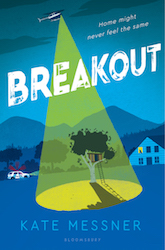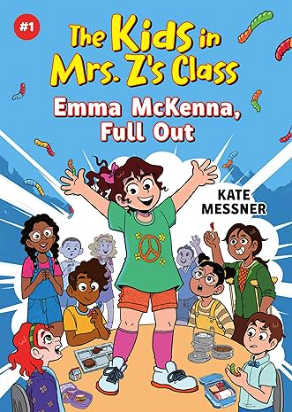Countdown to Breakout is a 23-day blog series about the three-year writing process for BREAKOUT, which earned starred reviews from both School Library Journal and Publishers Weekly. It’s about a small-town prison break and manhunt that change the way three kids see their neighbors and the place they call home. Why a 23-day series? Because this book was inspired by the 2015 Clinton Correctional Facility prison break that led to a 23-day manhunt in June of 2015.
Working with Expert Readers
As writers, we tell stories about all different kinds of characters and situations, and only some of those are drawn from our own experiences. I’ve written about coral restoration, drug addiction and recovery, tornadoes, and genetic engineering. I’m not an expert in any of those things, so getting the details right required hours and hours of reading as well as consulting with people who are experts in those topics, who have the expertise that I lack. Writing about characters from different cultural backgrounds requires that same kind of care, too, and at an even higher level because poor representation can have a profoundly negative effect on young readers from marginalized groups.
BREAKOUT has three main characters who do most of the storytelling. Nora Tucker is the prison superintendent’s daughter, and Lizzy Bruno is Nora’s best friend. Both are white girls who were born and raised in a small rural town, and both share backgrounds that are fairly similar to mine. But the third main character, Elidee, is an African American girl from the Bronx, who’s moved to Wolf Creek and discovered that she’s one of just two black kids at her new school. Those aren’t experiences I’ve had, so I had to rely on my past work in teaching middle school as well as a lot of reading and talking with people to get a sense for how Elidee might perceive the events in the story and what that move might mean to her.
That involved working with expert readers, or sensitivity readers, as they’re sometimes called. Quite simply, these are people who usually share elements of character’s background, and who read manuscripts for the purpose of shining a light on places where an author’s ignorance, lack of experience, or implicit biases are having a negative effect on their craft.
I had a lot of readers for BREAKOUT. Some were friends who shared part of Elidee’s background in that they’re black and went to school in urban areas or had the experience of being one of very few brown faces in a classroom or other community. They offered great insight, especially early in my revision process.
I also hired several professional readers to look at later drafts of the manuscript. They read BREAKOUT as I worked through final revisions and offered feedback, mostly related to Elidee’s character. An expert reader like this is paid for their work and typically takes anywhere from two weeks to a couple of months to read the book and write a letter providing feedback, pointing out places where the representation might not be solid or where more work needs to be done. This was incredibly helpful, and they pointed out some issues that my friends who read the book hadn’t mentioned.
I love my writer friends to pieces, but I’m also a big believer of having experts who don’t know you as readers because they don’t assume good intentions as friends might. My friends know who I am. They know about my support of diversity efforts in publishing. We’ve had long dinners together, and heartfelt conversations about racism, white supremacy, and social justice. At the end of the day, they know that my intentions are good. But good intentions aren’t enough when it comes to writing books with characters from marginalized groups. The reality is that my personal history with diversity and social justice issues doesn’t get to go out into the world with my book when it’s published. The story has to stand on its own. All stories do. So the reader you really want for a project like this is the toughest, most critical one you can find.
The letters that expert readers provide authors aren’t meant to be passed along, but I can share, in general terms, some of the invaluable suggestions I received from these readers.
1 – One pushed me to work more on Elidee’s relationship with her mom. Nora’s family felt more fully developed (probably because it was more like my own), and I needed to build that kind of closeness with Elidee and her mother.
2 – Elidee felt less developed as a character than the other girls, and one reader suggested that part of the problem was that I didn’t have a strong enough sense for where she’d come from before she moved. If Wolf Creek didn’t feel like home, what did?
3 – That same reader felt like Elidee’s reactions to some of the micro-aggressions she experienced in Wolf Creek weren’t realistic at first. As a new student who’d been taught how to fit in (and her mother would have made sure of this) her reactions should have been more nuanced, at least while she was getting to know people.
4 – Another reader pointed out that a character had used the phrase “circle the wagons,” which is based on negative stereotypes about Native people. It dates back to pioneer days when the thought was to circle up the covered wagons at night to protect white settlers from violent Natives (never mind that those settlers were arriving to steal their land). The line had nothing to do with the primary race issues in BREAKOUT, my reader noted, but can you imagine how it would feel if a teacher were reading this book aloud in a classroom with just one Native student? It didn’t matter that the line was a quick one, or that it came from a character who would have been clueless about its origins. It mattered that he said it, and it went unchallenged in that scene, as if it was a fine thing to say. So I had a decision to make as a writer – either take the time to unpack that language and explain its racist origin on that page, or find a different way to get the idea across. Explaining would have added multiple paragraphs that took away from what was happening in the story at a pretty tense moment. But the character’s use of that phrase wasn’t a one-time thing – the phrase echoed in several places later in the story. Ultimately, I ended up changing it – and going back to revise all the places where other characters had referenced the line later on.
For more on expert readers, I hope you’ll also read this Publishers Weekly piece from author, expert reader, Cake Literary cofounder, and We Need Diverse Books COO Dhonielle Clayton, who talks about how sensitivity readers work and raises the essential point that they are not a substitute for what is really needed in children’s publishing – more people from traditionally underrepresented backgrounds telling their own stories.
There have been some terribly misleading articles online about expert readers, or sensitivity readers, in recent months. I’ve even seen people who don’t understand this part of the writing process say that it’s censorship, that no one should tell an author what to write. I find that notion to be ridiculous. I can’t imagine writing a book about a particular branch of science or police work or law without consulting experts. This is no different, except the stakes are higher. When we’re writing about characters from traditionally marginalized groups, whose cultural backgrounds are different from ours, there’s a greater responsibility to do everything we can to get it right because poor representation in fiction harms kids in the real world.
Ultimately, that responsibility rests with the author – not the expert reader, who only gives advice. Tomorrow and the next day, I’ll share more about my research and revision after I heard from those expert readers. Here’s today’s prompt:
Your Assignment: What are some elements of your own cultural or personal background that would be tough for an outsider to understand or write about without research and conversations?
Thanks for joining me on this part of the Breakout writing-process journey! If you’d like to read the other posts in this series once they’re all posted, you can find them here.

Buy BREAKOUT now:





“Circle the wagons” — thank you for sharing the feedback, your thinking, and your decision about that phrase! It is on my page of “Common phrases.” I hear it all the time in discussions of national politics, along with “off the reservation.” Both are dreadful.
Thank you Kate. I’m looking forward to reading BREAKOUT.
Kathi